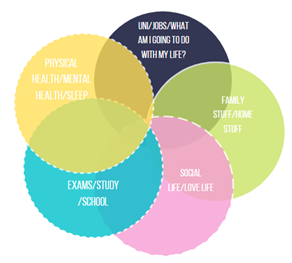As the 2021 school year begins, some young people’s minds may be already turning to what lies in store. Especially those young people in their final years of education. Thoughts go to assessments, exams, timelines, teachers, friends, social lives, and university/jobs! How do you fit all that in, still have a life and get the results you want?
This all creates stress.
And that’s the last thing you really want to be dealing with at such a crucial time of your life.
We all encounter stress in our lives. When we manage it well, it does not last. But some people suffer stress and anxiety to a point where it severely impacts on their ability to live their lives to the fullest. It stops them from doing things they would like to do. Stressful moments in life like the final years of schooling are times where we need to look out for this overwhelming anxiety that could have big impacts and disruption to our lives.
Stress is not always a bad thing. Sometimes stress makes us perform better. Take the case of athletes – it is important for them before a competition to experience some stress as it helps them perform at an optimum level. The same could be said for sitting a test. If you weren’t a little stressed about this it may mean you’re too relaxed and under prepared. Stress can give us motivation and the ability to focus. Too much stress on the other hand can lead to poor performance because you are too nervous and your mind is preoccupied with stress. This means you can’t focus on the task at hand.
Stress and anxiety impact on the way we think, feel and behave. Each of these components are related and together they impact us.
We all experience physical symptoms of stress which in themselves are scary enough. Some may experience racing heartbeat or the feeling of our heart trying to beat outside our chest. Our breathing can change to an uncomfortable level to the point where we feel out of breath despite not doing anything physically challenging. Stress effects sleep, appetite, muscle tension, a sick feeling in your stomach and can make it difficult to concentrate.
Stress effects the way we think. Our thoughts can be very negative when we are stressed:
- We form negative conclusions about ourselves (“I’ll always fail at maths”)
- The way we think about ourselves (“I’ll never get into uni/job/ I can’t handle all of this work”).
- Then we may form negative conclusions about other events (“This teacher doesn’t like me/That exam was too hard”).
These thoughts make us feel stressed, anxious, overwhelmed, irritable and/or sad. We start to behave different when we feel this way. We start to avoid things like work/study/school/other people. We might prefer to stay in our room and not leave the house. We develop nervous habits. We procrastinate and this impacts on the way we work and study.
Some stress responses to be aware of & monitor:
- Difficulties sleeping (both avoidance of sleep or not wanting to get out of bed)
- Feeling numb
- Irritability, anger and frustration
- Fearfulness and helplessness
- Confusion, lack of attention, difficulty making decisions
- Physical reactions (headaches, stomach aches, easily startled)
- Depression or anxiety symptoms
- Suicidal thoughts
- Withdrawal and isolation from normal activities
-
Excessive overthinking and anxious ruminations
Managing this stress is a very important skill to learn that will serve an individual well throughout their whole lives. As well as learning some time management, organisational skill and specific study skills, we can also teach ourselves ways to manage our thoughts, feelings and behaviours to ease our fears, worries and anxiety to make stressful times more manageable. Here are some ways to get started…
Step 1. Practice self-compassion
You’ve probably heard of self-care but sometimes that can feel overwhelming too – just another list of things you ‘should’ be doing. When you’re feeling overwhelmed with stress, try self-compassion first. Self-compassion is the process of reminding yourself that you are human, that all humans make mistakes and struggle at some point, and that you don’t have to be perfect. Be kind to yourself, the way you would to a friend who was feeling overwhelmed with stress.
Step 2. Ask for help / Learn more about stress management
Everyone experiences stress. Everyone can benefit from learning how to manage stress well. There is lots of helpful information available from credible sources with a little bit of careful research. In addition to this, at Beam Health, we run a program for students years 10 to 12 called Study without Stress. In the program the student will learn:
- How stress and anxiety works and how we can manage it
- The ways thoughts, feelings and behaviours change when we are anxious and how we can challenge our thinking
- How to deal with unhelpful thinking styles
- Organisational skills such as study timetables and effective study techniques
- Relaxation skills
- Exam preparation
- How to manage perfectionism and procrastination
- Problem solving skills
- Goal setting
- Work life balance
To find out more about the program click on this link: Study Without Stress Program





Our goal is to help at this very important time of your life. Hopefully the tips we can give may help ease some of this stress and give you the best opportunity to perform to your best and achieve what you desire.

Darrin Carter
Registered Psychologist, Beam Health










